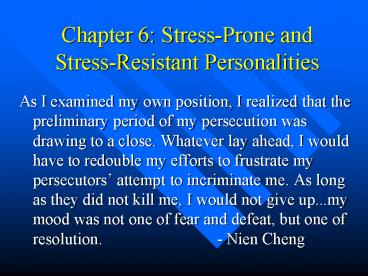Chapter 6: Stress-Prone and Stress-Resistant Personalities PowerPoint PPT Presentation
Title: Chapter 6: Stress-Prone and Stress-Resistant Personalities
1
Chapter 6 Stress-Prone and Stress-Resistant
Personalities
- As I examined my own position, I realized that
the preliminary period of my persecution was
drawing to a close. Whatever lay ahead, I would
have to redouble my efforts to frustrate my
persecutors attempt to incriminate me. As long
as they did not kill me, I would not give up...my
mood was not one of fear and defeat, but one of
resolution. - Nien
Cheng
2
Personality
- Personality is thought to be comprised of
several - traits
- characteristics
- behaviors
- expressions
- moods
- feelings
- (as perceived by others)
3
Personality
- The complexity of ones personality is thought
to be shaped by - genetic factors
- family dynamics
- social influences
- personal experiences
4
Personality Types Stress
- Type A behavior
- Codependent personality
- Helpless-hopeless personality
- Hardy personality
- Type R personality (sensation seeker)
5
Type A Behavior
- time urgency
- polyphasia
- ultra-competitiveness
- rapid speech patterns
- manipulative control
- hyperaggressiveness and free-floating
hostility - Hostile aggression 1 CHD predictor
6
Social Influences Type A
- Material wealth
- Immediate gratification
- Competitiveness
- People as numbers
- Secularization
- Atrophy of the body and right brain
- Television watching
7
Codependent Personality Traits
- ardent approval seekers
- super-overachievers
- crisis managers
- devoted loyalists
- perfectionists
- martyrs/manipulators
- victims
- reactionaries
- inferiority/inadequacy
8
Codependent Personality Behaviors
- External referencing
- Lack of emotional boundaries
- Impression management
- Mistrust of ones own perceptions
- Martyr syndrome
- Lack of spiritual health
9
Codependents Fears
- Fear of rejection
- Fear of the unknown
- Fear of failure
- Need to be needed
10
Helpless-Hopeless Personality
- a.k.a.
- Learned Helplessness
- The Theory of Attribution
- Locus of control
11
Learned Helplessness Develops
- When individuals experience uncontrollable life
events. - When individuals believe they can do nothing to
change the outcome of the events. - When individuals develop inappropriate
expectations that outcomes of future events will
also be beyond their control.
12
Learned Helplessness deficits/consequences
- Motivational deficits
- apathy, listlessness, giving up
- Cognitive deficits
- decreased ability to learn new responses
- Emotional/Affective deficits
- depression, lowered self-competence
13
Learned Helplessness
Internal/External Global/Specific Stable/Unstable
I control what happens to me. The world controls what happens to me This event has huge effects. This event has limited effects. Things will always be like this. Things can change.
Personal Pervasive Relatively permanent
14
Learned Helplessness
- When a bad thing happens, do you think it will
just be a bad day? - Do you succeed because you are smart? Lucky this
time? Or because things just happened to work
out? - Do you fail because you are stupid? Because life
is unfair? - LANGUAGE
- I failed the test because Im stupid I cant
pass any tests. (internal-stable-global) - Everyone who took the exam with me failed that
test was unfair Ill pass other tests.
(external-unstable-specific attribution)
15
Hardy PersonalityA Stress Resilient Personality
- Commitment
- Control
- Challenge
16
Hardy / Type A
- Resilient people may have many Type A
traitsbut MINUS feelings of hostility. - Resilient people enjoy life and hurry in order to
experience more. They love life.
17
Type R personalitysensation seekers
- Zuckerman identified the sensation-seeking
personality, as those people who seek thrills and
sensations but take calculated risks in their
endeavors they appear to be dominated by an
adventurous spirit.
18
Self-EsteemThe Bottom-Line Defense
- Basic elements of high self-esteem
- connectedness
- uniqueness
- personal power
- models / mentors
- Be OK with the fact that there are some things
over which we have NO control!
19
Self-EsteemRaise and/or Maintain
- No criticism
- Positive reinforcements and affirmations
- Avoid should haves
- Focus on internal self
- Avoid comparisons
- Diversify
- Improve connectedness
- Avoid self-victimization
- Know your value!
20
- SELF-IMAGE
- how you perceive yourself
- SELF-ESTEEM
- how you value yourself
21
(No Transcript)

